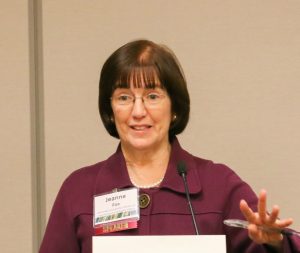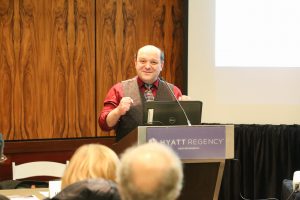Register for the 2020 Redevelopment Forum!
Registration is open for the 2020 Redevelopment Forum on Friday, March 6 at the Hyatt Regency in New Brunswick.
New Jersey Future’s annual Redevelopment Forum is our biggest event of the year, attracting more than 500 attendees. Join us to share innovative ideas, learn best practices, network and make our state a better place for tomorrow.
Redevelopment Forum: A Cost-Effective Investment
This article was provided by Valerie Jackson, director of economic development for the City of Plainfield.
New Jersey Future’s Redevelopment Forum provided a cost-effective opportunity for elected officials and residents serving on the City of Plainfield Planning Board and Zoning Board of Adjustment to get further education and training on redevelopment trends, best practices, and new tools. This year the city sent 19 people to the Redevelopment Forum, including Mayor Adrian O. Mapp, who was also a speaker, several City Council members, staff from multiple departments, and members of the Planning Board and Zoning Board of Adjustment. The insight gained at the forum has not only facilitated the adoption of designations of areas in need of redevelopment and of redevelopment plans, and approval of site plans but has also helped staff to understand their role in the redevelopment process.
“It is so exciting to hear Planning Board members explain the importance of redevelopment to the public based on knowledge gained at the workshops,” said Director of Economic Development Valerie Jackson, who attended the Forum. “Some of the biggest advocates for redevelopment are residents. They are partners in helping to shape robust redevelopment plans that meet the current and future needs of the city.”
Mayor Mapp said at his recent State of the City address that together “we are creating a smarter, safer and stronger city.” Each member of the city that has a leadership role, whether elected, staff or volunteer, must be well informed in order to be able to do this, he said. “The City of Plainfield is committed to making the required investment in all of its resources to drive investment in the city. Plainfield is in a renaissance period, which is the result of each team member working hard, contributing, and sharing ideas and resources to move the city forward.”
We hope other municipalities will join the city in sending delegations to next year’s Redevelopment Forum, so we can all become better informed, exchange ideas and network with other towns.
Keynote: Equity as the Superior Growth Model
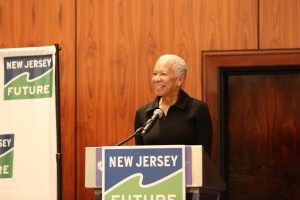 New Jersey Future was honored to host PolicyLink Founder in Residence Angela Glover Blackwell at our 2019 Redevelopment Forum. Blackwell’s work is centered on the idea that public policy can and should promote equity. It’s a nice concept, but what does it have to do with redevelopment and New Jersey Future’s work?
New Jersey Future was honored to host PolicyLink Founder in Residence Angela Glover Blackwell at our 2019 Redevelopment Forum. Blackwell’s work is centered on the idea that public policy can and should promote equity. It’s a nice concept, but what does it have to do with redevelopment and New Jersey Future’s work?
First, let’s recap what we mean when we talk about equity. Equity is providing equal access, opportunity, and treatment to everyone, while eliminating barriers that have currently or historically prevented the full participation of certain groups.
New Jersey Future believes that true progress cannot be made in the redevelopment world unless policy decisions are made through an equity lens. We invited Angela Glover Blackwell to share her findings so that we can all make sure our work in communities will help everyone thrive.
Leadership, Engagement, Change: The Keys to Place-Led Redevelopment
Businesses and workers are changing the kinds of demands that are put on a place. The public sector still needs to catch up.
Leadership, engagement, change: These were the themes that speakers at the Redevelopment Forum plenary session on Making Every Place a Great Place To Live and Work emphasized as critical to successful redevelopment in the face of shifting economic trends.
Jennifer Vey, the director of Brookings Institution’s newly established Anne T. and Robert M. Bass Center for Transformative Placemaking, set the stage with some historical context (view her presentation here) and a look at how recent technology and economic shifts — desire for professional collaboration, demand for easy access to amenities, potential for remote work — are changing the demands that are put on a place.
Photos, Presentations and Summaries!
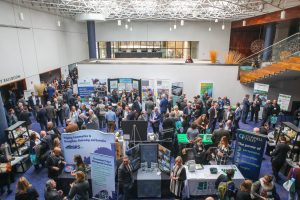 Our thanks to all the speakers, sponsors and attendees who helped make Redevelopment Forum 2019 such a success!
Our thanks to all the speakers, sponsors and attendees who helped make Redevelopment Forum 2019 such a success!
If you’re looking for session presentations, you can find links to them from the respective session pages (click on a session title from the Agenda page), or find them all together on our SlideShare channel.
If you’re looking for photographs, you’ll find them either on our Facebook page or our flickr channel; please feel free to tag yourself!
And if you’re looking for session summaries, just scroll down, or find them linked from the appropriate session page.
Save the date! Redevelopment Forum 2020 is Friday, March 6. See you there!
Finding the Opportunities in Opportunity Zones
This summary was written by Jeffrey Stoller. Mr. Stoller is president of BJS Communications in Moorestown, N.J.
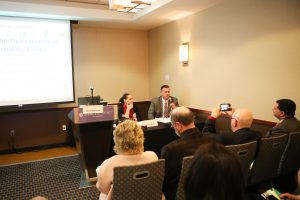
Lillian Plata, Esq. of Nee Plata Law and Eduardo Rodriguez from the City of Elizabeth discuss Opportunity Zones.
Since enactment of the 2017 Tax Cuts and Jobs Act, a broad range of developers, public officials, and community leaders have viewed the law’s Opportunity Zone (OZ) designations as a powerful tool for bringing new housing and business activity to low income areas nationwide.
The OZ program seeks to channel significant amounts of investor capital gains income into local development projects, in exchange for reduced or eliminated capital gains taxes. At first glance, there’s something in it for everyone: new amenities and jobs for distressed neighborhoods; more tax revenues for municipalities; a significant infusion of cash for developers; and reduced or waived capital gain taxes for long-term investors.
Are There Virtues in Vices?

L to R: Anthony Pizzutillo, Donald Sammet, Ed DeVeaux and Courtenay Mercer discuss the virtuous side of allowing “vices” as part of downtown redevelopment.
Vices. New Jersey cities and towns have long tried to regulate vices and the businesses that supply them: bars, tattoo parlors, smoke shops, and various forms of adult entertainment. Yet, as more towns look to reinvigorate their Main Street storefronts and downtown areas, are there ways that some of these vices could actually be beneficial to a municipality?
Building the Infrastructure New Jersey Needs
This summary was written by Jeffrey Stoller. Mr. Stoller is president of BJS Communications in Moorestown, N.J.
For many years, New Jersey’s transportation, energy and water infrastructure has not kept pace with the urgent demands of its 21st century industries and population. Clearly, a major challenge for the state will be how to generate new funding for critical infrastructure upgrades when it is already facing large-scale fiscal problems.
Green Infrastructure Moves to the Forefront
The horizon for stormwater management in New Jersey is about to change significantly. As part of the 2019 Redevelopment Forum on March 8, a panel consisting of Michele Adams, president of Meliora Design; Adrienne Vicari, financial services practice leader at Herbert, Rowland and Grubic; Gregg Woodruff, sustainability leader at Langan Engineering and Environmental Services; and Stephen Marks, business administrator for the City of Hoboken, highlighted several major initiatives that will influence how future development is managed and how it will affect the environment.
How Do We Realize Equity in Redevelopment?
The moral reason for equity should be enough, but there are good economic reasons too. So how do we realize equity through redevelopment?
At the New Jersey Redevelopment Forum, during a breakout session, panelists discussed how their work is promoting equitable redevelopment, providing support for the economic case. They then engaged attendees in an open discussion on the considerations that must go into a redevelopment project if it is to be equitable.


